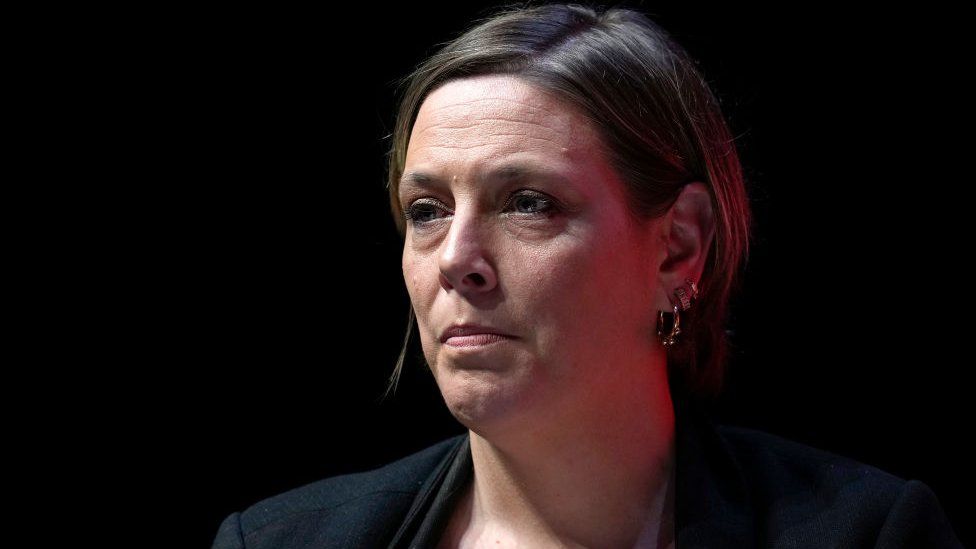ARTICLE AD BOX
 Image source, Getty Images
Image source, Getty Images
Jess Phillips was one of the 10 MPs to resign their front bench positions
By Henry Zeffman
Chief political correspondent
Clearly, the Labour rebellion over a ceasefire in Gaza was embarrassing for Sir Keir Starmer.
It's the biggest parliamentary revolt he's suffered in his three and a half years as Labour leader, which is especially unusual because over that time he has generally tightened his grip over the party.
If anything, Sir Keir was fortunate that the rebellion took place in such a wild week of political developments, rather than with Westminster's focus solely on the divisions in his ranks.
Regardless, it is likely to provide political ammunition for Rishi Sunak.
We got a preview of this at Prime Minister's Questions on Wednesday, with Mr Sunak taunting Sir Keir across the despatch box: "He talks about a changed Labour Party… he can not even make his party do the right thing when it comes to standing by Israel."
That was before the vote. Expect much more of it from Mr Sunak now that more than a quarter of Sir Keir's MPs have defied him.
Yet there are reasons Sir Keir might draw consolation and even - some of his allies claim - optimism from the vote and the debates leading up to it.
"He was very resolute throughout," one confidant of the Labour leader said. "He didn't blink at all." This, they argue, will mean attacks from the Conservatives on the issue will fall flat.
Drawing attention to the internal opposition Sir Keir has faced could also draw attention to the political strength he showed in facing it down.
At the heart of this dispute was Sir Keir's view that a ceasefire would "freeze" the conflict as it is and embolden Hamas to carry out more attacks. But Labour strategists also believe the politics is in their favour.
While polls have suggested a majority of the public supports a ceasefire, some around the Labour leader take the view that diverging from the government on this issue could make foreign policy a more vulnerable area for Labour in the run-up to the general election campaign.
It is worth stressing, too, that this was not a wider revolt against Sir Keir's leadership. It was confined to one highly-charged issue, with many of those who resigned frontbench roles eager to proclaim their continuing determination to campaign for a Labour government.
And while losing 10 frontbenchers is a problem, it could have been more. Double that number had expressed public unease with Sir Keir's position.
Sue Gray, the Labour leader's new chief of staff, was closely involved in the efforts to win some of the frontbenchers round, I'm told.
"She's got the conflict resolution skills you'd expect from decades at the top of Whitehall. She's much more emotionally intelligent than some of us steeped in the Labour Party," one shadow cabinet minister said.
You'll never catch a Labour MP saying this publicly, but some of them believe that among those who resigned are people who should never have been on the front bench. Their presence, the argument goes, was testament to some in Sir Keir's team being too willing to accommodate the 'soft left' of the Labour Party.
As a result of last night's vote, there are also no longer any MPs from the Socialist Campaign Group, the organising body for Labour's most left-wing MPs, on the front bench. Of the 56 MPs who defied Sir Keir, 27 are members of this group.
Image source, PA Media
Image caption,The Labour leader on a visit to a distillery in Glenrothes the day after the rebellion in his party
This is one reason why Sir Keir's team have been paying such close attention to whom local parties are selecting as candidates for the general election. Almost none of those chosen in the most winnable constituencies so far are associated with the Labour left.
And it's striking that of the 10 Labour MPs who have entered Parliament in by-elections since he became leader, none rebelled. So the Labour ranks could look pretty different after the next election.
Of course, for many of the Labour MPs who did rebel this was not ideological, but about their own consciences and often about pressure from hundreds or even thousands of constituents.
The clearest example of that is Jess Phillips, who is so far from the Labour left that in 2020 she briefly ran for leader with the support of Rachel Reeves, Pat McFadden and Wes Streeting, all on the right of the party and now leading members of Sir Keir's shadow cabinet.
Those MPs who have spent recent weeks wrestling with the competing forces of party allegiance and constituency anger are, of course, dealing with a question that has faced MPs of all parties for hundreds of years: are they representatives or are they delegates?
Or as one senior Labour MP put it to me just before the vote: "I have had hundreds of emails from constituents on this and I take them seriously. But I just think they are wrong."

 1 year ago
25
1 year ago
25








 English (US) ·
English (US) ·